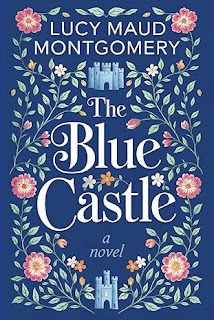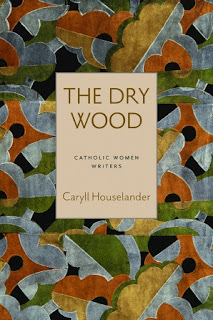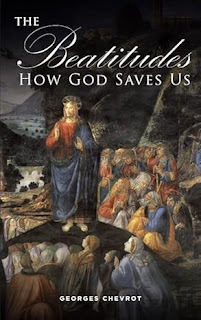Preview: Summer Reading Suggestions on Monday
I have two novels and one spiritual reading book to recommend.
 The first novel is The Blue Castle by Lucy Maud Montgomery, the author of the Anne of Avonlea novels. It's kind of a Cinderella story. Valency, a spinster, finally leaves her family home (because she's been told she's dying), takes care of a young girl dying of tuberculosis (who's been ostracized by the community), and then asks a man, Barney Snaith (whom her family suspect of some horrible past) to marry her. He marries her, perhaps out of pity--she does tell him she loves him--knowing she has but a year to live, as the doctor wrote to her.
The first novel is The Blue Castle by Lucy Maud Montgomery, the author of the Anne of Avonlea novels. It's kind of a Cinderella story. Valency, a spinster, finally leaves her family home (because she's been told she's dying), takes care of a young girl dying of tuberculosis (who's been ostracized by the community), and then asks a man, Barney Snaith (whom her family suspect of some horrible past) to marry her. He marries her, perhaps out of pity--she does tell him she loves him--knowing she has but a year to live, as the doctor wrote to her."The Blue Castle" has been Valency's imaginary refuge within her family life, where she's been the drudge and disappointment because of her spinsterhood, and she finds that refuge with Barney as they become friends and grow to love each other. Her other great pleasure has been reading books about nature by John Foster, whom Barney rejects as an expert.
Montgomery fills the book with descriptions of the forest and wildlife surrounding Valency's real Blue Castle, a cabin on an island in a lake, a refuge for both of them.
I won't give away the denouement of course, but it was a moving novel for me to read, especially as it depicted marital love growing from friendship--and a couple who can enjoy sitting together in silent companionship.
 The second novel is
The Dry Wood
by Caryll Houselander, better known as a spiritual writer and mystic. It is part of the Catholic Women Writers series from the Catholic University of America Press. It is her only novel "set in a post-war London Docklands parish. There a motley group of lost souls are mourning the death of their saintly priest and hoping for the miraculous healing of a vulnerable child whose gentleness in the face of suffering brings conversion to them all in surprising and unexpected ways."
The second novel is
The Dry Wood
by Caryll Houselander, better known as a spiritual writer and mystic. It is part of the Catholic Women Writers series from the Catholic University of America Press. It is her only novel "set in a post-war London Docklands parish. There a motley group of lost souls are mourning the death of their saintly priest and hoping for the miraculous healing of a vulnerable child whose gentleness in the face of suffering brings conversion to them all in surprising and unexpected ways."As the editors of the series, Bonnie Lander Johnson and Julia Meszaros, comment in the introduction, The Dry Wood is both very experimental and very Catholic: you can almost smell the incense and hear the bells when Houselander describes a Benediction service (one detail: the congregation watching the altar server light each of the candles on the Altar with great attention!). After starting one story about the deceased parish priest and hopes for the cure of child with painful birth defects, she starts telling about new characters with new plots and incidents. There's more exposition and description than action in some ways, but the narrative still drives forward.
If you've read some of Houselander's spiritual writing, you'll recognize her characteristic insight that we should see Christ's image in everyone, not just those who seem virtuous or pious. One character, Rose O'Shane, works hard, practices great charity, but also drinks a bit too much; she could be judged as not worthy of regard, but Houselander reveals her holiness and helps us see the Christ in her. It's beautifully written and I can't be tempted to share the ending because I haven't finished it as of today.
 The spiritual work I recommend is by an author, Pere Georges Chevrot of Paris, I just discovered this Easter when a friend and I read and discussed The Easter Impact: How the Resurrection Restores and Strengthens Our Faith. So I obtained and just finished
The Beatitudes: How God Saves Us
:
The spiritual work I recommend is by an author, Pere Georges Chevrot of Paris, I just discovered this Easter when a friend and I read and discussed The Easter Impact: How the Resurrection Restores and Strengthens Our Faith. So I obtained and just finished
The Beatitudes: How God Saves Us
:This is a revised edition of The Eight Beatitudes, published by Scepter Dublin in 1959.
Our duty as Christians is not only to recognize the deep spiritual needs of our world today, but to help solve them through our own dedication to the Beatitudes. This new edition of French author George Chevrot’s THE BEATITUDES lays out in dramatic detail the extraordinary impact that the message of Jesus Christ had on the first witnesses to his public preaching which became known as the Sermon on the Mount.
Jesus calmly lays out a radical program of personal reform, contrary to every experience and teaching up to then. Happiness comes to those who do not seek themselves, but the needs of others. We should not seek to be happy, but blessed, and the key lies in direct service to others.
Above all other considerations, the Beatitudes impose a program of personal struggle which represents the foundation of Christian life. Only when these teachings are lived will society also reflect that Christian life.
In the chapter on "Blessed are the peacemakers", Chevrot offers this fascinating connection: "The seventh Beatitude is like a touchstone which will join the Sermon on the Mount with the Discourse after the Last Supper . . . " (p. 123) as he explicates " . . . the peacemaking mission with which he entrusted us". (p.124) Chevrot matches two of Jesus's statements which we can think are contradictory:
"Peace I leave with you; my peace I give to you." (John 14:27) AND "Do not think that I have come to bring peace on earth; I have not come to bring peace, but a sword." (Matthew 10:24).
Then Chevrot points out, He didn't say he brought "war" instead of "peace". He said He brought a "sword": the efforts, choices, and renunciations that will cost us to create peace. Because peace doesn't mean the absence of conflict: it may take some conflict to create peace.
And in the chapter on the Eighth Commandment, there's an incredible passage on Pilate's "Ecce Homo" presentation, as the Procurator believes Jesus is innocent, but the Elites countermand his attempt at mercy!
As my friend and I agreed when we read The Easter Impact, Chevrot offers unique insights in the support of practical counsel for the Christian life.



